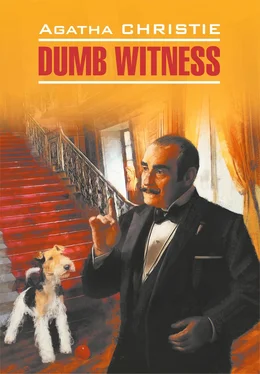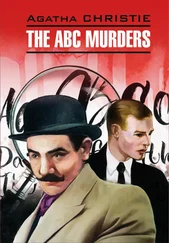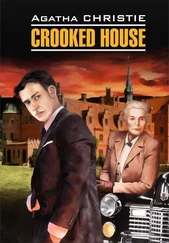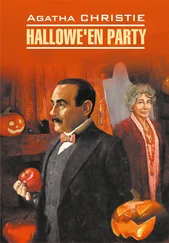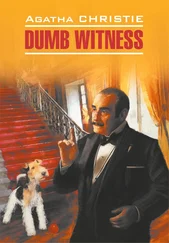‘Donaldson? Yes, he came to supper one night.’
‘What do you think of him?’
‘A clever fellow. I fancy he’ll go far—if he gets the chance. It takes money to specialize.’
‘You mean that he is clever in his profession.’
‘That is what I mean, yes. A first-class brain.’ He smiled. ‘Not quite a shining light in society yet. A little precise and prim in manner. He and Theresa make a comic pair. The attraction of opposites. She’s a social butterfly and he’s a recluse.’
The two children were bombarding their mother.
‘Mother, can’t we go in to lunch? I’m hungry. We’ll be late.’
Poirot looked at his watch and gave an exclamation.
‘A thousand pardons! I delay your lunch hour.’
Glancing at her husband Mrs Tanios said, uncertainly:
‘Perhaps we can offer you—’
Poirot said quickly:
‘You are most amiable, madame, but I have a luncheon engagement for which I am already late.’
He shook hands with both the Tanioses and with the children. I did the same.
We delayed for a minute or two in the hall. Poirot wanted to put through a telephone call. I waited for him by the hall porter’s desk. I was standing there when I saw Mrs Tanios come out into the hall and look searchingly around. She had a hunted, harried look. She saw me and came swiftly across to me.
‘Your friend—M. Poirot—I suppose he has gone?’
‘No, he is in the telephone box.’
‘Oh.’
‘You wanted to speak to him?’
She nodded. Her air of nervousness increased.
Poirot came out of the box at that moment and saw us standing together. He came quickly across to us.
‘M. Poirot,’ she began quickly in a low, hurried voice. ‘There is something that I would like to say—that I must tell you—’
‘Yes, madame.’
‘It is important—very important. You see—’
She stopped. Dr Tanios and the two children had just emerged from the writing-room. He came across and joined us.
‘Having a few last words with M. Poirot, Bella?’
His tone was good-humoured, the smile on his face pleasantness itself.
‘Yes—’ She hesitated, then said, “Well, that is really all, M. Poirot. I just wanted you to tell Theresa that we will back her up [417] to back up – поддерживать
in anything she decides to do. I quite see that the family must stand together.’
She nodded brightly to us, then taking her husband’s arm she moved off in the direction of the dining-room.
I caught Poirot by the shoulder.
‘That wasn’t what she started to say, Poirot!’
He shook his head slowly, watching the retreating couple.
‘She changed her mind [418] to change one’s mind – передумать
,’ I went on.
‘Yes, mon ami, she changed her mind.’
‘Why?’
‘I wish I knew,’ he murmured.
‘She will tell us some other time,’ I said hopefully.
‘I wonder. I rather fear—she may not…’
CHAPTER 18. ‘A Wolf in the Manger ’
We had lunch at a small restaurant not far away. I was eager to learn what he made of the various members of the Arundell family.
‘Well, Poirot?’ I asked impatiently.
With a look of reproof Poirot turned his whole attention to the menu. When he had ordered he leaned back in his chair, broke his roll of bread in half and said with a slightly mocking intonation:
‘Well, Hastings?’
‘What do you think of them now you’ve seen them all?’
Poirot replied slowly.
‘Ma foi [419] Ma foi – (фр.) Ну
, I think they are an interesting lot [420] lot – (зд.) люди
! Really, this case is an enchanting study! It is, how do you say, the box of surprises? Look how each time I say, “I got a letter from Miss Arundell before she died,” something crops up [421] to crop up – обнаруживаться
. From Miss Lawson I learn about the missing money. Mrs Tanios says at once, “About my husband?” Why about her husband? Why should Miss Arundell write to me, Hercule Poirot, about Dr Tanios?’
‘That woman has something on her mind,’ I said.
‘Yes, she knows something. But what ? Miss Peabody tells us that Charles Arundell would murder his grandmother for twopence, Miss Lawson says that Mrs Tanios would murder anyone if her husband told her to do so. Dr Tanios says that Charles and Theresa are rotten to the core, and he hints that their mother was a murderess and says apparently carelessly that Theresa is capable of murdering anyone in cold blood.
‘They have a pretty opinion of each other, all these people! Dr Tanios thinks, or says he thinks, that there was undue influence. His wife, before he came in, evidently did not think so. She does not want to contest the will at first. Later she veers round [422] to veer round – изменять (взгляды)
. See you, Hastings—it is a pot that boils and seethes and every now and then a significant fact comes to the surface and can be seen. There is something in the depths there—yes, there is something! I swear it, by my faith [423] by my faith – клянусь честью
as Hercule Poirot, I swear it!’
I was impressed in spite of myself by his earnestness.
After a minute or two I said:
‘Perhaps you are right, but it seems too vague—so nebulous.’
‘But you agree with me that there is something ?’
‘Yes,’ I said hesitatingly. ‘I believe I do.’
Poirot leaned across the table. His eyes bored into mine.
‘Yes—you have changed. You are no longer amused, superior—indulging me in my academic pleasures. But what is it that has convinced you? It is not my excellent reasoning— non, ce n’est pas ça [424] non, ce n’est pas ça – (фр.) нет, это не так
! But something —something quite independent—has produced an effect on you. Tell me, my friend, what is it that has suddenly induced you to take this matter seriously?’
‘I think,’ I said slowly, ‘it was Mrs Tanios. She looked— she looked— afraid..’
‘Afraid of me?’
‘No—no, not of you. It was something else. She spoke so quietly and sensibly to begin with—a natural resentment at the terms of the will, perhaps, but otherwise she seemed so resigned and willing to leave things as they are. It seemed the natural attitude of a well-bred but rather apathetic woman. And then that sudden change—the eagerness with which she came over to Dr Tanios’ point of view. The way she came out into the hall after us—the— almost furtive way—’
Poirot nodded encouragingly.
‘And another little thing which you may not have noticed—’
‘I notice everything!’
‘I mean the point about her husband’s visit to Littlegreen House on that last Sunday. I could swear she knew nothing of it—that it was the most complete surprise to her—and yet she took her cue [425] to take one’s cue – ориентироваться
so quickly—agreed that he had told her about it and that she had forgotten. I—I didn’t like it, Poirot.’
‘You are quite right, Hastings—it was significant that.’
‘It left an ugly impression of—of fear on me.’
Poirot nodded his head slowly.
‘You felt the same?’ I asked.
‘Yes—that impression was definitely in the air.’ He paused and then went on. ‘And yet you liked Tanios, did you not? You found him an agreeable man, open-hearted, good- natured, genial. Attractive in spite of your insular prejudice against the Argentines, the Portuguese and the Greeks—a thoroughly congenial personality?’
Читать дальше
Конец ознакомительного отрывка
Купить книгу
